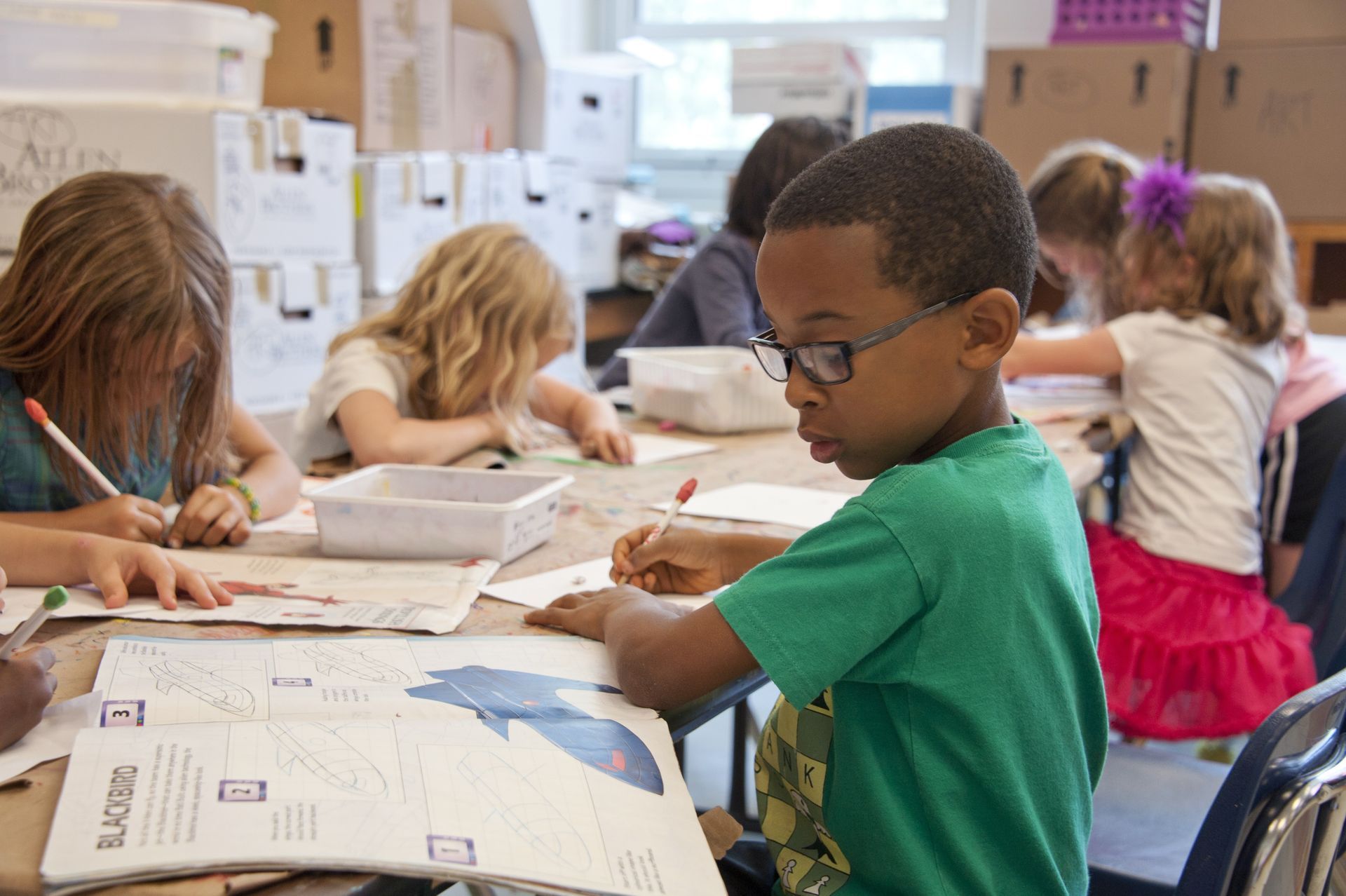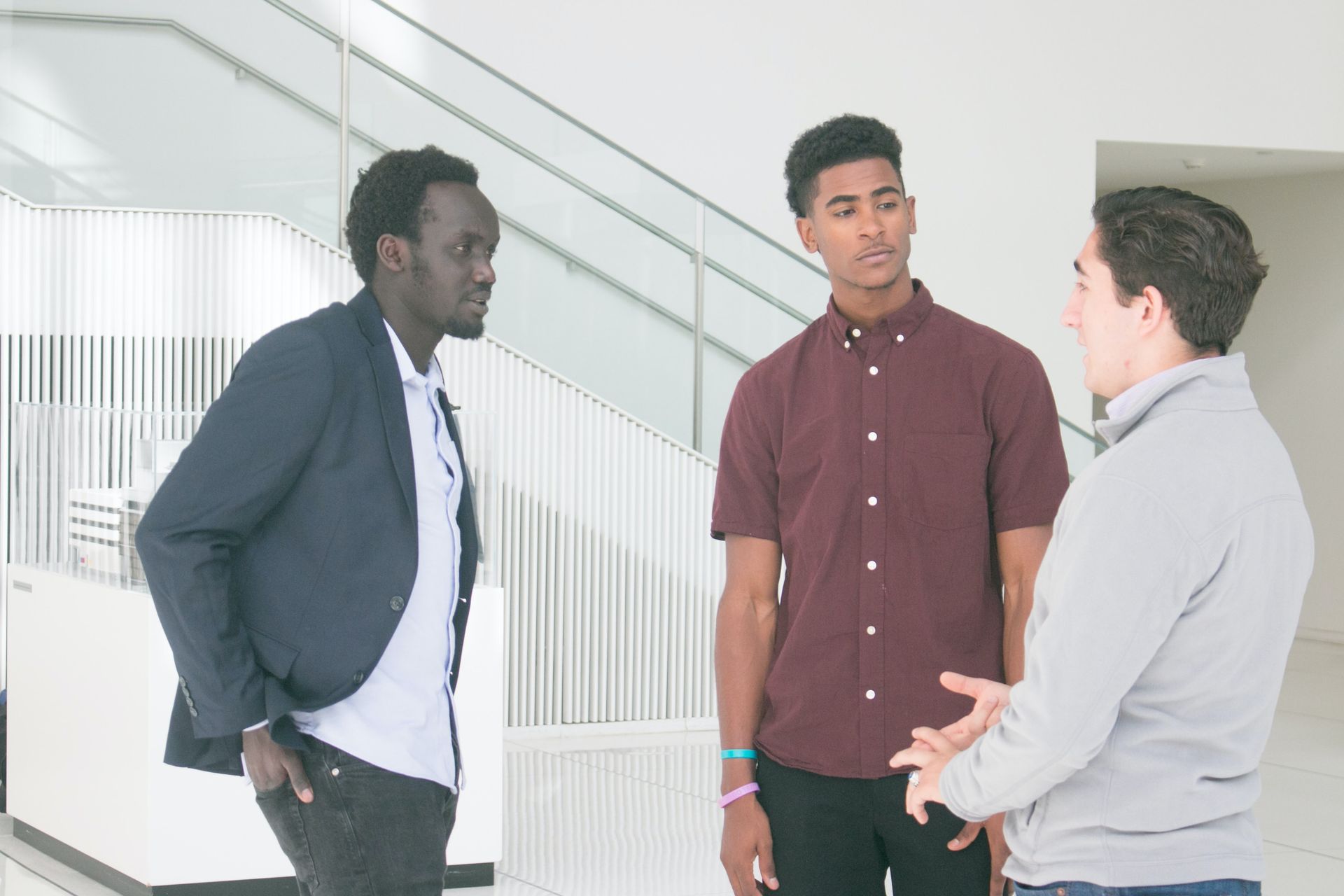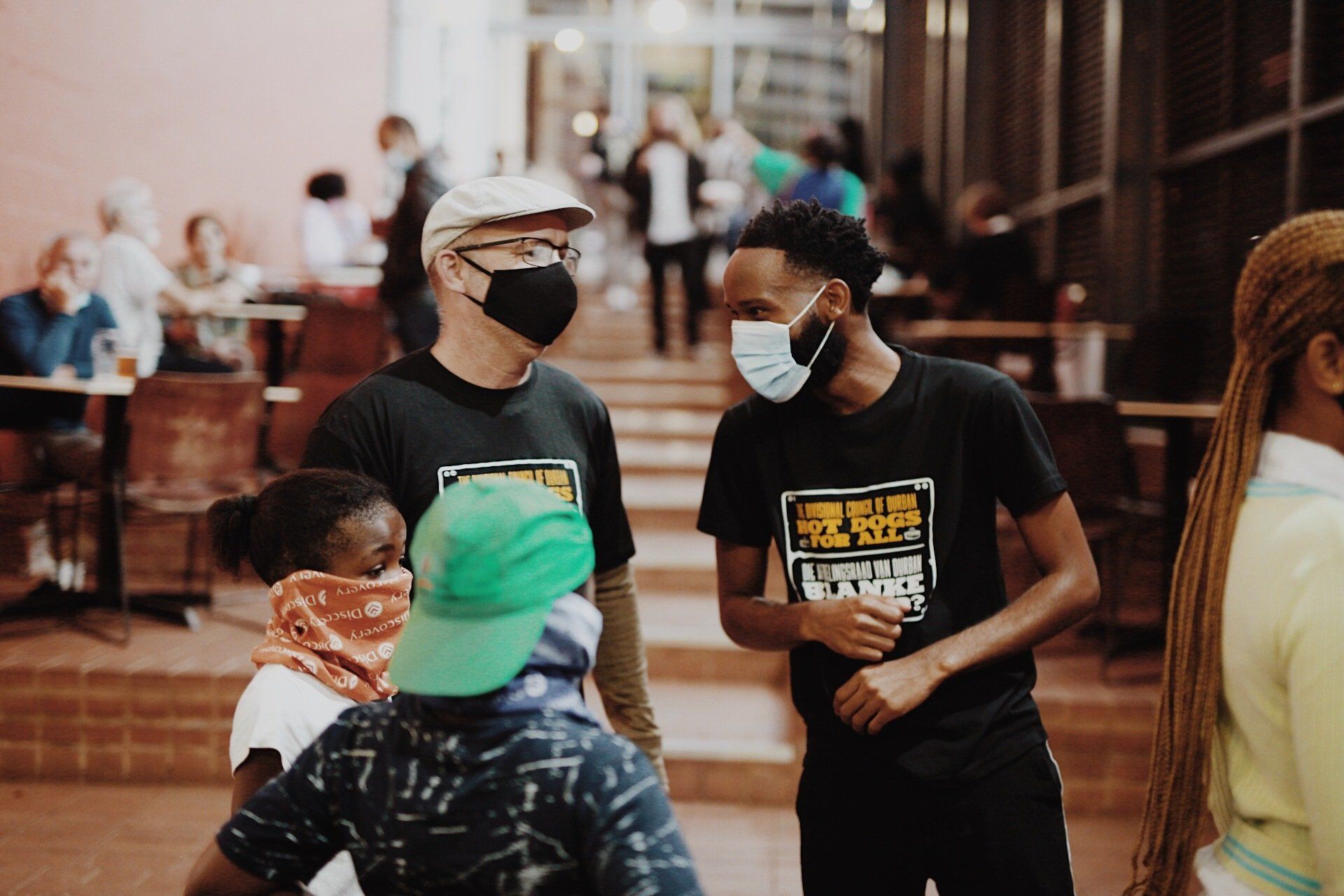ARHD in the news

From Houses to Hotdogs: Wandile Mthiyane on Anti-Racist Architecture
The South African architect is taking lessons from Apartheid-era planning to address structural racism in Northern American culture.
- Hannah Feniack

Picture this. You’re a child living in Anytown. Your best friend’s family lives across the street. Every morning, you meet Rory at the mailbox on the corner to walk to school together. You play in each other’s yards, sometimes with other neighborhood kids. After a rash of neighborhood home invasions, your parents announce that you’re moving to a new city. They say it’s safer. You’re devastated. Everything you know and love is here, on this street where you grew up. When it’s time to start the new school, your chest is heavy with pain and fear. What will the other kids think of you? How will they dress? What if the teachers are mean? But when the teacher announces you’re a new kid from Anytown, the kid in the desk closest to you inches his desk further away. A couple girls widen their eyes and lean into each other and whisper, glancing at you and then away. At lunch, you sit alone at an empty table. You hear the chatter surrounding you. “My mom says you can’t trust people from Anytown.” “I heard they set fires.” “You shouldn’t wear that ring to school anymore. New kid might steal it.” You had been afraid of the unknown. But it turns out, they are afraid of you. This is a simplified example of xenophobia. But what is xenophobia? Let’s discuss. What is Xenophobia? You may have heard the term but aren’t sure exactly what it means. Merriam-Webster defines xenophobia as, “fear and hatred of strangers or foreigners or of anything that is strange or foreign.” Further, xenophobia comes from the Greek words xenos , which means stranger or guest, and phobos , meaning fear. Hence, fear of strangers. You may be wondering what the difference between racism and xenophobia is. While many people use the terms interchangeably, they do have different meanings. Considering xenophobia is the fear and hatred of strangers or foreigners, how does racism differ? Racism is the “prejudice, discrimination, or antagonism by an individual, community, or institution against a person or people on the basis of their membership in a particular racial or ethnic group, typically one that is a minority or marginalized.” While some beliefs and practices of xenophobia and racism can overlap, and one can be both racist and xenophobic, there are distinct differences. A person who is racist prejudges people of different races. These prejudices lead to actions of discrimination, oppression, or violence against people in the marginalized community. A xenophobic person may hate or fear people of the same race based solely on their nationality. They hold negative perceptions of foreigners, even those of the same race. Xenophobia can manifest in many ways, including: Speaking out against immigrants and refugees Mistrust of anyone perceived as an outsider Pushing for stricter national borders and security practices Voting for people and policies that aim to restrict immigration Telling anyone different to ‘go back where they came from’ Insisting your native language and accent is the only one accepted A racist person may do all of the above things. But they also visit these behaviors on neighbors, colleagues, and classmates they’ve known for years based strictly on their skin color. Racism gains power through the privilege and power held by the dominant culture. Racism = Racial Prejudice + Power. Further, white privilege exists because of racism. White people have benefited from preferential treatment in employment, education, and legislation. Those benefits are born from the oppression of People of Historically Racially Marginalized Groups (PHRMG). But, why does xenophobia exist? Examining Xenophobia To understand xenophobia, it’s important to look at its possible origins. Mistrust of anyone perceived as different may have protected humans of the past. In fact, Intercultural Development Research Institute (IDRI) says, “Xenophobia may have served an evolutionary purpose in the development of homo sapiens by allowing them to automatically reject potentially competitive groups.” But humans and society have both evolved since then. We aren’t the hunter-gatherers fighting for survival in the wild. We shop for necessities and live in homes that protect us from most dangers. So why do people still judge and mistreat others based on perceived or actual differences? Part of this can be attributed to the narrative spun by certain news outlets or politicians. Politicians will create or exaggerate their constituents' perceived danger and then propose a solution to the problem. This strategy is meant to garner votes, and subsequently, power. If you tell everyone that eating tomatoes causes cancer unless they purchase your magic tonic, you’ll sell tonic. Fear is a powerful motivator. If the narrative tells voters that a certain group of people is dangerous then proposes legislation or physical walls to keep them safe, people vote accordingly. Xenophobia leads to the oppression of certain groups while raising the oppressors to positions of power. So, the cycle continues. But why might citizens be susceptible to these outrageous claims? One possibility is a lack of diversity. If you live in a community populated with people like yourself, you are more likely to believe mistruths or misconceptions about people who differ from you. And some politicians exploit that ignorance for their own gain by fear mongering for votes. Education failures can also contribute to xenophobia. When children are taught only about their own culture, they don’t have the benefit of factual information to draw from when faced with misinformation. This lack of knowledge or misinformation can carry through to adulthood. Like racism, modern xenophobia is often learned. Parents pass on their beliefs to their children. Friends convince each other of what they feel is the truth. And it spreads. So, what can be done to combat xenophobia? Face Fears We, as a society, and as individuals, have to open our eyes and not be ruled by fear and unfounded claims. Bonyan Organization recommends some of the following to reduce xenophobia: Educate yourself. Read articles such as this one to learn about xenophobia. Provide diverse educational materials for your children. Self-awareness: Confront any misconceptions you may carry and challenge them. Cultural appreciation: Expand your understanding of and immerse yourself in different cultures. Expose your children to other cultures as well. Inclusivity: Insist upon diverse and inclusive practices at work, in schools, and in organizations to make sure all people have a voice and accurate representation . Speak out: Speak out against xenophobic comments, jokes, or microaggressions . Promote DEI practices and vote for people and policies that serve everyone. Eliminate Hate Xenophobia is driven by fear and misunderstanding. Politicians promote mistruths to gain power and control. But we don’t have to continue the cycle. While it can be difficult to challenge your understanding of the world and work to modify long-held misconceptions, it’s not hopeless. For example, social alliances are key to dismantling a system of racism, fear, and xenophobia. You are less likely to fear what you know and experience regularly. Building a coalition of diverse people will enrich your experiences while expanding your worldview. Open your eyes and mind to prejudices you may hold within. We must work together to create a more inclusive, understanding, and peaceful culture. Contact us for help getting your school, workplace, or organization on the right track to combating xenophobia. We won’t be ruled by unfounded fears.

Picture this. You’re a kid who loves science. And you’re good at it. You read science books in your free time and conduct experiments to satisfy your curiosity. By high school, you know this is what you want to do with your life. You attend a career fair to meet specialists and learn more about potential fields of study. You walk into the fair and everyone–from the presenters to the attendees–look different from you. They have different skin tones, hair colors, and speak different languages. You can’t relate. You don’t know where you fit in, if you fit in at all. Maybe this wasn’t for you after all. Intimidated and deflated, you leave without speaking to anyone. This can be the experience of children from marginalized communities when representation in careers and popular culture is not equal. What is representation, and why is it important? Let’s look deeper into representation. Global Gaps Representation can be defined as how, or how often, media portrays people. According to the Arab Film & Media Institute (AFMI), underrepresented people include “women, people of color, LBGTQA+ people, people with a range of body shapes and types, people of non-Christian religions, and differently-abled people. There has been a steady increase of diversity in media, but progress has been long and slow.” For example, in 1992, Crayola expanded its range to include Multicultural Crayons in response to feedback received from consumers and educators. After consulting with skin tone and diversity and inclusion experts, Crayola launched their Colors of the World crayons in 2020. While Crayola may have made attempts decades ago, other companies failed to represent all customers until more recently, if at all. But it wasn’t until 2021 that Band-Aid created adhesive bandages for skin tones other than Caucasian. While society has made progress in racial equality, there is clearly a long way to go. When, in 2021, Nigerian medical student, Chidiebere Ibe, created and shared medical illustrations featuring Black bodies, it went viral. NBC News reports that social media fame wasn’t his goal. Instead, Ibe stated, “I was just sticking up for what I believe in, advocating for equality in health through medical illustrations.” The fact that this was news in 2021 illustrates we still have much to do. As essential as accurate medical illustrations are in learning about human anatomy, they still mainly feature white men. Shocking when you consider that white people make up only 16% of the world population, according to Rutland Herald . Yet the standard is to teach medical professionals using imagery largely composed of white men. This practice carries on into pop culture. Most mainstream films star white actors. Statistica states, “In 2022, nearly 70 percent of all male characters appearing in the top 100 highest-grossing films in the United States were white.” Representation of Black men drops to a staggering 14%, with people from other marginalized communities represented far less. The Importance of Representation So, why does equality in representation matter? Moorepay explains that representation is important for young people forming perceptions about their identity, directly impacting self-esteem. Lack of representation or the prevalence of negative stereotypes are problematic because “people can struggle with their identity development, or form negative perceptions of their own groups.” When children grow up seeing magazines, toys, and screens filled mainly with people who look different from themselves, it can cause self-esteem issues. Psychology Today says that scholars and community leaders have declared it’s "hard to be what you can’t see." The assertion is that People of Historically Racially Marginalized Groups (PHRMG) are less likely to pursue careers or academic opportunities because they are less exposed to the possibilities. They don’t see people like them, so they don’t think they can work in certain jobs or do particular activities. This can create a domino effect of oppression where the dominant culture controls what is seen in the workplace and popular culture, and subsequently affects people in marginalized communities. Pushing Progress You can do your part to push progress. Edutopia explains that what our young people see around them positively or negatively shapes their expectations for themselves and for each other. As such, it’s important to represent diversity in an accurate, good light. Attempts at appearing diverse create further problems if not done correctly. For example, resorting to stereotyping or including token PHRMG can add to negative societal perceptions. According to the Arab Film & Media Institute (AFMI), “Stereotyping can be seen in media through the assumptions of how a certain type of person is supposed to be due to their racial, ethnic, gender, sexual or religious identity.” Perpetuating stereotypes, even just as a “joke,” creates negative perceptions that persist and grow in society. Some people then accept stereotypes as fact and treat others according to those misconceptions. AFMI goes on to explain that tokenism is seen everywhere from “the ‘diversity hires’ at work, to the gay best friend in a television show.” Tokenism also misrepresents people or communities, using them as props or punchlines rather than treating them with respect. Creating positive representation starts with you. We’ve listed a few things to get you started. Insist upon fair and equitable recruitment, hiring, and promotion practices at work. Set targets in creating a more equitable work environment where PHRMG are in leadership positions. Donate classroom materials and books to schools with positive examples of different races, roles, levels of affluence, and gender identities. Volunteer to speak for schools or organizations about your culture, career, or experiences. A young person might see their future self in you. We must work together to ensure all people in all communities are positively represented. Positivity Breeds Prosperity Positive, equitable representation is vital for healthy development. And happy, healthy citizens contribute to a prosperous society. We must make a conscious decision to include everyone fairly. If you’re not sure where to start, contact us . We provide no-judgment consultations to help get your business, school, or organization on the right track.

What’s the deal with cultural appropriation, anyway? Isn’t it a way to honor other cultures? Many people think that borrowing styles or customs from other cultures is a harmless way to pay homage. But it’s not so simple. Treating precious traditions as fashion trends can cause pain to others. Let’s explore the tricky topic of cultural appropriation. What is Cultural Appropriation? Picture this. You’re a young child who takes your red backpack to school daily. It’s the same one your older brother used and features patches sewn on by your grandmother. Some of the patches are your brother’s interests: his favorite sports, music, and games. You’ve since added some of your own. It helps you feel closer to your brother, who has gone away to college. You were so proud when you could use it and proudly strap it to your back each day. Your heart sinks when classmates start bullying you for the backpack, which isn’t as new and stylish as theirs. You have to choose between fitting in or staying true to yourself. The stress becomes too much to bear, and you worry all the classmates’ tugging and pulling will damage the treasured item, so you switch to a designer-brand backpack in plain black. A few months later, one of the popular, wealthy jocks at school, Taylor, starts wearing a backpack similar to your family's. It’s red with patches sewn all over it. Soon, other kids are using similar knockoffs. The trend takes off. Taylor uses a nearly identical backpack and is praised and copied. But when you used your original, you were ridiculed, shoved, and teased. It makes no sense, and it seems unfair. This is a very simple comparison to the unfairness of cultural appropriation. How Cultural Appropriation Can Hurt Perhaps one of the patches on your backpack is of a soccer ball, your brother’s favorite sport. Seeing the patch reminds you of sitting in the bleachers with your parents, watching him play. Summer afternoons spent in the backyard where he tried to teach you all of his moves. It’s not just a soccer ball patch to you. It’s a reminder of special times with your family. It stings to see Taylor’s backpack with a similar patch, knowing he doesn’t have siblings or play soccer. It’s simple mimicry. Worse is that he is celebrated while you were attacked. People of Historically Racially Marginalized Groups (PHRMG) go through comparable experiences when they wear clothing, sport hairstyles, use speech patterns, or practice traditions different from the dominant culture. As discussed in a previous blog post, Black women experience discrimination in the workplace for having natural Black hairstyles. Many feel pressured to alter their hair to align with the dominant white culture. This forces them to abandon tradition and work against their natural hair type so that they can get or keep a job. Further, white celebrities are praised for wearing the same hairstyles that Black women are chastised and prejudged for wearing. For example, claims of cultural appropriation plague the Kardashians as they sport hairstyles and physical attributes long celebrated within the Black community but ridiculed by the dominant culture. Kendall Jenner faced backlash after wearing an afro-like hairstyle on the cover of Vogue . Readers pointed out that Black women had been scorned and faced discrimination for the same hairstyle. Subsequently, many Black women resorted to chemical straighteners to avoid criticism for their natural beauty. Frustrations mount as members of the Kardashian family continue to appropriate traditional Black features by donning cornrows and lip fillers, seeming not to learn from public outcry. Brittanica further explains, “Black people with locs have been barred from walking at high-school graduations , denied jobs , wrongfully associated with drug use , and otherwise discriminated against . As a result of systemic racism, Black people face consequences for wearing dreadlocks that non-Black people do not. Non-Black people wearing their hair in dreadlocks is cultural appropriation.” What is Cultural Appropriation? So what qualifies as “cultural appropriation”? How do you know if you’re doing it? If you, your family, or your ancestors have lived through experiences that led to adopting styles or customs, then it’s probably not appropriation. Ask yourself if you know the history or reasoning behind the style you want to adopt. It may not be yours to take if it has nothing to do with you or your roots. And borrowing from other cultures can be disrespectful. Surely, it won’t be well received if you’re in a dominant culture that doesn’t experience discrimination. You’ll be like Taylor, wearing the red backpack with patches, celebrated after the original owner was bullied. If you’re still unsure, here are some examples of common cultural appropriations. Sports teams or school mascots named after native tribes Cosmetic procedures to alter physical appearance to appear more like those in traditionally marginalized groups Adopting speech patterns or slang invented and used by traditionally marginalized groups Wearing hairstyles that are neither traditional nor natural to you or your culture that have been subject of discrimination for PHRMG Dressing up in costumes that depict the traditional wear of other cultures (e.g., headdress, face paint, clothing) Profiting from the adoption of practices, styles, or customs that are not your own But what if you want to honor other cultures? Halloween costumes are certainly not the best way to do so. Let's look at the subtle difference between appropriation and appreciation. Appropriation vs. Appreciation There is a fine line between appropriation and appreciation. However, there is a way to honor other cultures without adopting and tainting their traditions. According to Greenheart , “Appreciation is when someone seeks to understand and learn about another culture in an effort to broaden their perspective and connect with others cross-culturally. Appropriation, on the other hand, is simply taking one aspect of a culture that is not your own and using it for your own personal interest.” So, what is your motivation? Are you interested in trying new styles and keeping up with trending fashions? Or are you trying to learn more about other cultures? For example, sugar skull face paint has become popular, with photos of people proudly posing in sugar skull-painted faces on social media. But how many of those people know the sacred significance of the practice to Mexicans? Regina Merson, Mexican-American beauty entrepreneur and founder of Reina Rebelde , tells POPSUGAR , "It is not a holiday about fantasy or horror, but rather something that is meant to be soulful and uplifting and positive. One of the most offensive things is when people paint a Catrina and make the look intersect with something scary and bloody. That Catrina represents your dead relative, not a comic book character." Henna tattoos (mehndi) are another tradition that’s been adopted by the majority culture for fashion purposes without considering its sacred meanings to the cultures from whom it’s been taken. Henna artist, Mangala Bühler-Rose of Mehndi NYC , tells How Stuff Works , "It's important for clients to note that symbolism in many henna designs is sacred. Some communities even consider the substance itself to be sacred. Thus, henna and symbols are used respectfully, sensitively and knowledgeably. For example, placing an image of the deity Gaṇeśa on the feet would be considered disrespectful." According to Sadia Islam , an independent henna artist in the United Kingdom, it’s surprising how many people are interested in the designs but unaware of the background. “I noticed that I would talk about henna with people who were unaware of what it means to us. Even teachers who used to teach me history were clueless about the cultural significance.” Perhaps if more people learned the significance and meanings behind practices, they would know how to respect rather than merely copy other cultures. R-E-S-P-E-C-T: Find Out What It Means to Me In the confusion between appropriation and appreciation, how can we know what is okay and what might be harmful? Check your motivation. Is your Halloween costume really about appreciating another culture or are you just trying to have fun? Look further by asking yourself how you would feel if someone adopted a part of your family traditions or religious practices without fully understanding. It can be offensive to turn a belief into a passing fad. First and foremost, seek understanding. Read books and blogs about other cultures to immerse yourself in their history and experiences. Knowing the significance of items and practices will help you appreciate what you mean to borrow. Find out what it means to the culture to truly respect and honor them. If you have questions about race or cultural differences, we’re here to help. Contact us to learn more about our services to help get schools, organizations, and workplaces on the right track.

We’ve likely all seen the now-viral video of the March 2022 Gym-Start gymnastics event in Dublin, Ireland where an official hands out medals to all the young children standing patiently in a row. Except one, the lone Black girl. The official passes her by. Unfortunately, this incident isn't an abberation. Racism and discrimination against children run rampant worldwide, according to a 2022 UNICEF report. Data analysis shows disparities in treatment and opportunities based on children’s ethnicity, language, and religion, no matter in what country or territory they live. “Exclusion and discrimination during childhood cause harm that can last a lifetime,” said UNICEF Executive Director Catherine Russell. “This hurts us all. Protecting the rights of every child – whoever they are, wherever they come from – is the surest way to build a more peaceful, prosperous, and just world for everyone.” But how can discrimination cause life-long harm? And what can be done about it? Let’s take a look at the long-term effects of racism on children. Intergenerational Deprivation and Poverty It’s fair to assume that most of us experience some kind of aggravation as children. We were picked on because we were too tall, or too short, or maybe had an unconventional name. It made our formative years more challenging and might have stuck with us for years afterward. So, what makes experiencing racism or discrimination any different? UNICEF explains, “Discrimination and exclusion deepen intergenerational deprivation and poverty, and result in poorer health, nutrition, and learning outcomes for children, higher likelihood of incarceration, higher rates of pregnancy among adolescent girls, and lower employment rates and earnings in adulthood.” Your height as a child may have invited ridicule from classmates, but it won’t deny you rights or opportunities as an adult. Discrimination against children from historically marginalized communities is a lifelong continuation of oppression. For example, when a child is denied basic education or healthcare, their chances for success as an adult are lessened. Similarly, when a child is teased and tormented by their peers, or treated differently by adults, they don’t feel safe or included. Children don’t perform as well in school when they are anxious or in fear. An education is a vital foundation for a productive, successful life, and every child deserves the chance to live without fear. For any society to thrive, it must depend on its citizens. A society populated by adults who were excluded and mistreated as children has lower chances of success than one whose children were supported and cared for equally. Racism creates the problem and then blames the victims for suffering its effects. Chronic Wear and Tear We’ve established that racism and discrimination still sadly occur worldwide. But the long-term effects aren’t as widely discussed. A friend said to me, “We all get picked on in school. It toughens you up.” But does it? According to What To Become , a space for advice about education and career-building, “Bullying is a common occurrence at school, online, in the workplace, and even at home. Most often, people become subjects of bullying because of their race, sexual orientation, appearance, or disability.” Unsurprisingly, they also report that students who have experienced bullying claim that bullying has a major impact on their mental health and confidence. Perhaps more alarming is the fact that bullied students are twice as likely to attempt suicide and 60% of school shooters report having been bullied. And consider that racism and discrimination are present everywhere. So, while many children might experience bullying, children from historically marginalized communities walk around beneath a cloud of racism everywhere they go. They receive discrimination and mistreatment from classmates, as well as teachers and administration. Then, outside school, they are followed closely by shopkeepers, shouted at by neighbors for the simple offense of stepping on their lawn, and treated as inherent criminals by law enforcement. In fact, the University of Cincinnati states that “Black children report experiencing an average of five instances of racial discrimination per day.” These children grow up knowing a different way of life than their white counterparts. Childhood bullying doesn’t tend to follow white children everywhere throughout their lives as racism does to People of Historically Racially Marginalized Groups (PHRMG). The sustained, continued fear of harassment has a child constantly on edge. And this doesn’t toughen up anyone. Harvard University’s Center on the Developing Child reports, “When children’s response systems remain activated at high levels for long periods, it can have a significant wear-and-tear effect on their developing brains and other biological systems.. Lifelong effects on learning, behavior, and physical and mental health.” Further, they state that “a growing body of evidence from both the biological and social sciences connects this concept of chronic wear and tear to racism.” Far from toughening these children up, racism is breaking them down. Overwhelming evidence shows that “Black, indigenous, and other people of color in the U.S. have, on average, more chronic health problems and shorter lifespans than whites at all income levels.” But, as UNICEF found, racism is prevalent worldwide. So, it's a fair conclusion that the effects are, too. Remember the young, Black, Irish gymnast who was passed by for a medal amongst her white counterparts? Her mother told RTÉ's News at One that this incident has knocked her daughter’s confidence. The tepid and late response from Gymnastics Ireland worsened her frustration. It was over 18 months, and only after the video went viral internationally online, that Gymnastics Ireland issued an apology. "That is why I am calling on Gymnastics Ireland to embark on things like anti-racism training that will yield greater awareness that will help effect change for girls that are coming up around the world,” she said. Create Better Knowing the facts is only the first step in addressing these challenges. Providing services and access to all children and families is an essential foundation. But we must address the systemic inequities in place that attack the physical and mental health of children, and subsequently, adults in historically marginalized communities. So, we must identify and eliminate biases within ourselves as individuals, as well as in social and economic policies. Fair hiring, lending, housing, and policing initiatives are vital to providing a safe place where all children (and their caregivers) are protected. The Irish gymnast’s mother said, "It's a wake up call for the entire body of sports here. Regardless of who you are. Are you a volunteer? Are you staff? Whatever you may be doing, here should be some kind of anti-racism education.” We can help with that. Our fun, comprehensive training helps get your school, organization, or workplace operating in a more equitable and fair manner. We provide no-judgment consultations to address hidden biases that may be driving behaviors without you realizing. Start creating a better environment for the children in your community today. Contact us for more information. We’re here to help. For further reading on this very important topic, we recommend the following helpful and informative sources. https://www.uc.edu/news/articles/2023/05/us-news--black-kids-face-racism-before-they-start-school-driving-a-mental-health-crisis.html https://www.health.harvard.edu/blog/how-racism-harms-children-2019091417788 https://www.today.com/health/why-racism-can-have-long-term-effects-children-s-health-t186480 https://publications.aap.org/pediatrics/article/144/2/e20191765/38466/The-Impact-of-Racism-on-Child-and-Adolescent?autologincheck=redirected https://www.apa.org/monitor/2021/09/numbers-discrimination https://www.degruyter.com/document/doi/10.1515/jom-2022-0175/html?lang=en https://www.unicef.org/reports/rights-denied-discrimination-children https://developingchild.harvard.edu/resources/racism-and-ecd/

Imagine applying for a job that you are more than qualified for. You have the degree, skills, and years of experience, and are confident you’ll be a top contender. But, you don’t even receive a callback. This is the experience of people worldwide who face discriminatory hiring practices. Employers often pre-judge potential candidates just based on the name on a resumé, assuming they are of a certain demographic the employer deems less desirable. Although this practice has been made illegal in many countries, it continues. Let’s look more closely at discriminatory hiring practices. Dissecting Discriminatory Hiring Practices Northwestern University ’s Lincoln Quillian and John J. Lee analyzed job applications spanning 40 years (1969 - 2019) from a handful of European and North American countries to “study trends in hiring discrimination among four racial-ethnic origin groups: African or Black, Middle Eastern or North African, Latin or Hispanic, and Asian.” They found that, despite laws against discrimination in hiring, it still happens regularly. In fact, Quillian states, “Relative to white applicants, applicants of color from all backgrounds in the study had to submit about 50% more applications per callback on average.” This means that if the average white applicant must apply to 20 jobs before getting a callback, applicants of color must apply to 30 to achieve the same result. At the same time, The New York Times reported on an audit of hiring practices by economists Patrick Kline and Christopher Walters of University of California, Berkeley, and Evan K. Rose of the University of Chicago. The study saw hundreds of fake job applications sent to top companies across the U.S. where job applicants’ personal characteristics were random. However, names “were chosen purposefully to ensure applications came in pairs: one with a more distinctive white name — Jake or Molly, say — and the other with a similar background but a more distinctive Black name, like DeShawn or Imani.” Just as Quillian and Lee discovered, applicants with a perceived “Black-sounding name” also received fewer callbacks in this study. Clearly, despite laws against discriminatory hiring practices , it’s still occurring with alarming frequency. Consequences This issue doesn’t just affect employees. Study after study shows that companies who practice discrimination are less profitable. Gary Becker, Professor of Economics and Sociology at the University of Chicago, identified this issue in the 1950s. He sought to explain racial pay discrepancies and concluded that employers who discriminate are less profitable. In this information age, potential employees learn which organizations offer diverse, equitable environments and which do not. A quick internet search will reveal candidates’ experiences with any particular company. So, in addition to the possibility of being less profitable, companies who discriminate also risk isolating top talent. And there is yet more danger. Companies who practice unfair discriminatory hiring practices put themselves at risk of lawsuits. An American retail giant lost a discrimination lawsuit brought by U.S. Equal Employment Opportunity Commission (EEOC) when the suit proved they discriminated against a highly qualified Black woman in favor of a less-qualified applicant with a white-sounding name. They were ordered to pay $510,000 in compensation. Companies must be held accountable for laws and policies to hold any weight. When laws are enforced and lawsuits abound, hiring practices become more fair and equitable. Looking Forward Although the findings of recent studies are disappointing to be sure, all hope is not lost. Lincoln Quillian of Northwestern University concluded that progress is possible “if anti-discrimination policies are enforced, employers are held accountable, and mentorship programs support employees of color who are seeking promotion and advancement in particular fields.” We can help get your workplace, school, or organization on the right track. We offer non-judgemental consultations to ensure fair and equitable hiring, promotion, and educational policies. Look forward and be part of the solution. Contact us today.

In our efforts to dismantle racism, we often have uncomfortable discussions. While our goal is to help create safe spaces for all, the path to peace is sometimes rocky. This was particularly evident when speaking to a white woman recently. We held an education event where we spoke about systemic racism, among other things. This woman from the audience approached afterward and replied that she wasn’t happy with our discussion. She became visibly upset when confronted with the privilege afforded her by her skin color and the behaviors she exhibited that upheld racist systems. She responded by attacking our “tone,” claiming how we spoke offended her. This is a great example of “whataboutism.” According to Medium , whataboutism is defined as “the technique or practice of responding to an accusation or difficult question by making a counter-accusation or raising a separate issue.” Let’s discuss white whataboutism. What is Whataboutism? Imagine this. Cesar and Brian are friends and colleagues. After a long week, the two discussed an upcoming work project over drinks. Cesar was uninhibited in throwing ideas out to bounce off Brian, who dismissed them as too ambitious. But Brian pitched those ideas at work the following Monday as his own, leading to a promotion and a bonus. Cesar confronted Brian. Brian responded angrily, accusing Cesar of “coming after” him and speaking in a disrespectful tone. This example compares how the offender subsequently dismissed or attacked the wronged party. We often see this when addressing privilege and problematic behaviors with white people. But what’s really going on? Ignorance We never know exactly what others experience. So, it’s understandable that white people can’t accurately fathom how it feels to be on the receiving end of racism. They benefit from a system designed to elevate white people's experiences and lives. As such, many are ignorant of the struggles of others. They don’t live those struggles, so they don’t see them. Hence, when confronted with the realities of racism, they deny its existence. Some believe white privilege doesn’t exist because they, too, struggled in some way. But what they fail to recognize is that their race was not a contributing factor to their difficulties. For People of Historically Racially Marginalized Groups (PHRMG), oppression and discrimination are an everyday part of life. So, sadly, these white folks may honestly not believe “things aren’t as bad as they say.” Their response comes from a place of disbelief. And their disbelief can manifest in argumentative ways, such as projection or whataboutism. Consider a different scenario. A group of people are discussing their travel experiences. The Smiths remark that they disliked Paris because it was cold and rainy, and Parisians were rude. But the Kesslers were bewildered. They loved Paris. The weather was fantastic, and the locals they encountered were friendly. Two families with two different experiences. But the Kesslers don’t deny that the Smiths had a bad time in Paris. They acknowledge that the Smiths may have endured rude locals and unpleasant weather in the same city they greatly enjoyed visiting. However, the ability to accept different experiences seems limited when some white people deny the existence of racism. As uncomfortable as it may be, there comes a point where they have to accept what others tell them. Guilt There is another group of white people who are cognizant of issues of racism and inequality. But they may communicate poorly out of guilt and shame. Very Well Mind explains that this guilt can lead people to unlearn racist beliefs and join the fight against white supremacy. But some people “may disengage from the feelings of guilt and shame and become defensive.” When faced with the atrocities committed by their own people, shame is a reasonable response. Shame is uncomfortable. It forces one to accept that they have taken part in something disgraceful, maybe even harmful. How can people combat that uncomfortable feeling of shame? According to Psychology Today, the three most common defenses against feeling shame are narcissism, blaming, and contempt. So, it may be easier for a person to deflect than to accept. A white person may find it easier to tell themselves that they have not benefited from privilege and that systemic racism does not exist. To acknowledge these truths is to shake the foundation of all they know. Understanding the potential reason behind denial and dismissive actions from white people doesn’t excuse them. We’ve recently discussed ways to start conversations to inspire understanding and enlightenment. Ignorance and guilt are not insurmountable. Projection And all of these responses might be driven by projection. Projection is a psychological defense mechanism where we attribute our undesirable feelings or traits to someone else. We don’t even necessarily know we’re doing it. Whether ignorant or ashamed, people may react by trying to flip the script to alleviate their negative feelings. This is where whataboutism often occurs. Some examples of white whataboutism are: Citing exaggerated statistics of Black-on-Black crime Claiming that all people who comply with the police are treated the same Pointing out their personal struggles as supposed proof that white privilege doesn’t exist Accusing those who discuss racism of being divisive or disrespectful When PHRMG share their experiences of racism and discrimination and receive projection or whataboutism, it can feel like rubbing salt into the wound. Living it is bad enough. But being told your experiences are not as you lived them exacerbates and prolongs the trauma. Acknowledge the Flaws Mutual understanding and respect lead to more peaceful exchanges. When white people accept without question what PHRMG express as their truth, they are likely to feel uncomfortable. It’s not nice to acknowledge that you benefit from unfairness. But facing the truth, however distressing it may be, is the first step to change. To achieve an equal, fair, and just society, we must first acknowledge the flaws. Do you know of a workplace, school, or organization that could benefit from a consultation in diversity, equity, and inclusion? Send them our way ! We offer a no-judgment approach for optimal results.



